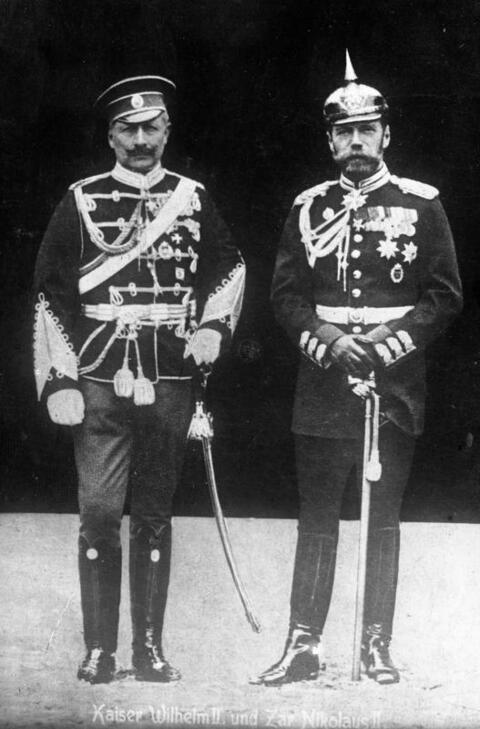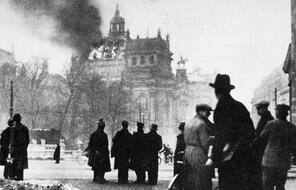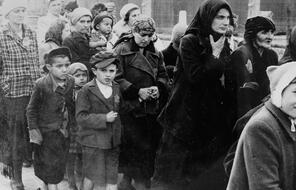A Last-Ditch Effort to Prevent a War
At a Glance
Language
English — USSubject
- History
- Human & Civil Rights
- The Holocaust
The spark that set off World War I came on June 28, 1914, when a young Serbian patriot shot and killed Archduke Franz Ferdinand, the heir to the Austro-Hungarian Empire. The assassination took place in Sarajevo, a town in the territory of Bosnia-Herzegovina on the Balkan Peninsula. Bosnia-Herzegovina had been taken over by Austria in 1908. The assassin and his co-conspirators belonged to a group that wanted Bosnia to break away from Austria and unite with the Kingdom of Serbia.
Austrian military leaders saw the assassination as an excuse for a quick war with Serbia, which would end with a victorious Austria taking over that country. After seeking and receiving a promise of full military support from Germany, with whom Austria-Hungary had an alliance, the Austrian government presented Serbia with a list of demands to which it must agree or face invasion. Europeans now expected war, and Austria and Germany began mobilizing their armies, or preparing them for the fighting. Russia, which had promised to come to the aid of Serbia in any war, also began to mobilize its armies. Serbia agreed to all of Austria-Hungary’s demands except one, which would have allowed Austria to take part in, if not control, an internal inquiry into the archduke’s assassination. To Austrian leaders, that single refusal was enough for a declaration of war against Serbia on July 25.
As the Austrian army began to invade Serbia, Kaiser Wilhelm of Germany and Tsar Nicholas of Russia, who were first cousins, made a last-ditch effort to contain the conflict through an exchange of telegrams—messages that in the early twentieth century were transmitted over wires through a series of electrical pulses that used Morse code. The exchange, which took place in English, began with a telegram sent by Nicholas shortly after midnight on July 29, 1914:
In this serious moment, I appeal to you to help me. An ignoble war has been declared to a weak country. The indignation in Russia shared fully by me is enormous. I foresee that very soon I shall be overwhelmed by the pressure forced upon me and be forced to take extreme measures which will lead to war. To try and avoid such a calamity as a European war I beg you in the name of our old friendship to do what you can to stop your allies from going too far.
Before Wilhelm received the telegram, he had already sent one to Nicholas:
It is with the gravest concern that I hear of the impression which the action of Austria against Serbia is creating in your country. The unscrupulous agitation that has been going on in Serbia for years has resulted in the outrageous crime, to which Archduke Francis Ferdinand fell a victim. The spirit that led Serbians to murder their own king and his wife still dominates the country. You will doubtless agree with me that we both, you and me, have a common interest as well as all Sovereigns to insist that all the persons morally responsible for the dastardly murder should receive their deserved punishment. In this case politics plays no part at all.
On the other hand, I fully understand how difficult it is for you and your Government to face the drift of your public opinion. Therefore, with regard to the hearty and tender friendship which binds us both from long ago with firm ties, I am exerting my utmost influence to induce the Austrians to deal straightly to arrive to a satisfactory understanding with you. I confidently hope that you will help me in my efforts to smooth over difficulties that may still arise.
On the evening of July 29, Wilhelm responded to Nicholas’s first message:
I received your telegram and share your wish that peace should be maintained. But as I told you in my first telegram, I cannot consider Austria's action against Serbia an “ignoble” war. Austria knows by experience that Serbian promises on paper are wholly unreliable. I understand its action must be judged as [seeking a] full guarantee that the Serbian promises shall become real facts. This, my reasoning, is borne out by the statement of the Austrian cabinet that Austria does not want to make any territorial conquests at the expense of Serbia. I therefore suggest that it would be quite possible for Russia to remain a spectator of the Austrian-Serbian conflict without involving Europe in the most horrible war she ever witnessed. I think a direct understanding between your Government and Vienna possible and desirable, and as I already telegraphed to you, my Government is continuing its exercises to promote it. Of course military measures on the part of Russia would be looked upon by Austria as a calamity we both wish to avoid and jeopardize my position as mediator which I readily accepted on your appeal to my friendship and my help.
Two hours later, Nicholas wrote:
Thanks for your telegram conciliatory and friendly. Whereas official message presented today by your ambassador to my minister was conveyed in a very different tone. Beg you to explain this divergence! It would be right to give over the Austro-Serbian problem to the Hague conference [for arbitration].
At 1:20 a.m. on July 30, the tsar sent yet another cable:
Thank you heartily for your quick answer. Am sending Tatischev [a Russian diplomat] this evening with instructions. The military measures which have now come into force were decided five days ago for reasons of defense on account of Austria’s preparations. I hope from all my heart that these measures won't in any way interfere with your part as mediator which I greatly value. We need your strong pressure on Austria to come to an understanding with us.
Wilhelm responded almost immediately:
Best thanks for telegram. It is quite out of the question that my ambassador’s language could have been in contradiction with the tenor of my telegram. Count Pourtalès (the German ambassador) was instructed to draw the attention of your government to the danger & grave consequences involved by a mobilization; I said the same in my telegram to you. Austria has only mobilized against Serbia & only a part of her army. If, as it is now the case, according to the communication by you & your Government, Russia mobilizes against Austria, my role as mediator you kindly entrusted me with, & which I accepted at you[r] express prayer, will be endangered if not ruined. The whole weight of the decision lies solely on you[r] shoulders now, who have to bear the responsibility for Peace or War.
The next day, on July 31, Wilhelm sent a second telegram:
On your appeal to my friendship and your call for assistance began to mediate between you and the Austro-Hungarian Government. While this action was proceeding, your troops were mobilized against Austro-Hungary, my ally. Thereby, as I have already pointed out to you, my mediation has been made almost illusory.
I have nevertheless continued my action. I now receive authentic news of serious preparations for war on my Eastern frontier. Responsibility for the safety of my empire forces preventive measures of defense upon me. In my endeavors to maintain the peace of the world I have gone to the utmost limit possible. The responsibility for the disaster which is now threatening the whole civilized world will not be laid at my door. In this moment it still lies in your power to avert it. Nobody is threatening the honor or power of Russia who can well afford to await the result of my mediation. My friendship for you and your empire, transmitted to me by my grandfather on his deathbed has always been sacred to me and I have honestly often backed up Russia when she was in serious trouble especially in her last war.
The peace of Europe may still be maintained by you, if Russia will agree to stop the military measures which must threaten Germany and Austro-Hungary.
At about the same time, Tsar Nicholas sent this telegram:
I thank you heartily for your mediation which begins to give one hope that all may yet end peacefully. It is technically impossible to stop our military preparations which were obligatory owing to Austria's mobilization. We are far from wishing war. As long as the negotiations with Austria on Serbia's account are taking place my troops shall not make any provocative action. I give you my solemn word for this. I put all my trust in God’s mercy and hope in your successful mediation in Vienna for the welfare of our countries and for the peace of Europe.
On August 1, the tsar telegraphed again:
I received your telegram. Understand you are obliged to mobilize but wish to have the same guarantee from you as I gave you, that these measures do not mean war and that we shall continue negotiating for the benefit of our countries and universal peace dear to all our hearts. Our long proved friendship must succeed, with God's help, in avoiding bloodshed. Anxiously, full of confidence await your answer.
On August 1, the kaiser replied to the tsar:
Thanks for your telegram. I yesterday pointed out to your government the way by which alone war may be avoided. Although I requested an answer for noon today, no telegram from my ambassador conveying an answer from your Government has reached me as yet. I therefore have been obliged to mobilize my army.
Immediate affirmative clear and unmistakable answer from your government is the only way to avoid endless misery. Until I have received this answer alas, I am unable to discuss the subject of your telegram. As a matter of fact I must request you to immediately order your troops on no account to commit the slightest act of trespassing over our frontiers. 1
Within hours, Germany declared war on Russia. Two days later, France, as an ally of Russia, joined in. Another monarch, Britain’s King George (who was also a cousin of Wilhelm and Nicholas), was trying to contain the fighting. He sent several urgent telegrams calling for arbitration, but neither side responded. Armies throughout the rest of Europe were ready for war.
- 1Isaac Don Levine, ed., The Kaiser's Letters to the Tsar (London: Hodder and Stoughton, 1920).
Kaiser Wilhelm II and Tsar Nicholas II

Kaiser Wilhelm II and Tsar Nicholas II
Kaiser Wilhelm II of Germany and Tsar Nicholas II of Russia in 1905, both wearing military uniforms associated with their empires.
Connection Questions
- How did the conflict between Austria and Serbia lead to European war?
- How did Nicholas and Wilhelm describe the conflict between their countries differently? How did each attempt to persuade the other? How did the tone of their communications change over time? Why might that be the case?
- What language did both leaders use to describe their roles as monarchs? What language did they use to describe their decisions to enter into war?
- Does the failure of the two leaders to stop the approach of war mean that war was inevitable? Why or why not?
How to Cite This Reading
Facing History & Ourselves, "A Last-Ditch Effort to Prevent a War," last updated August 2, 2016.








